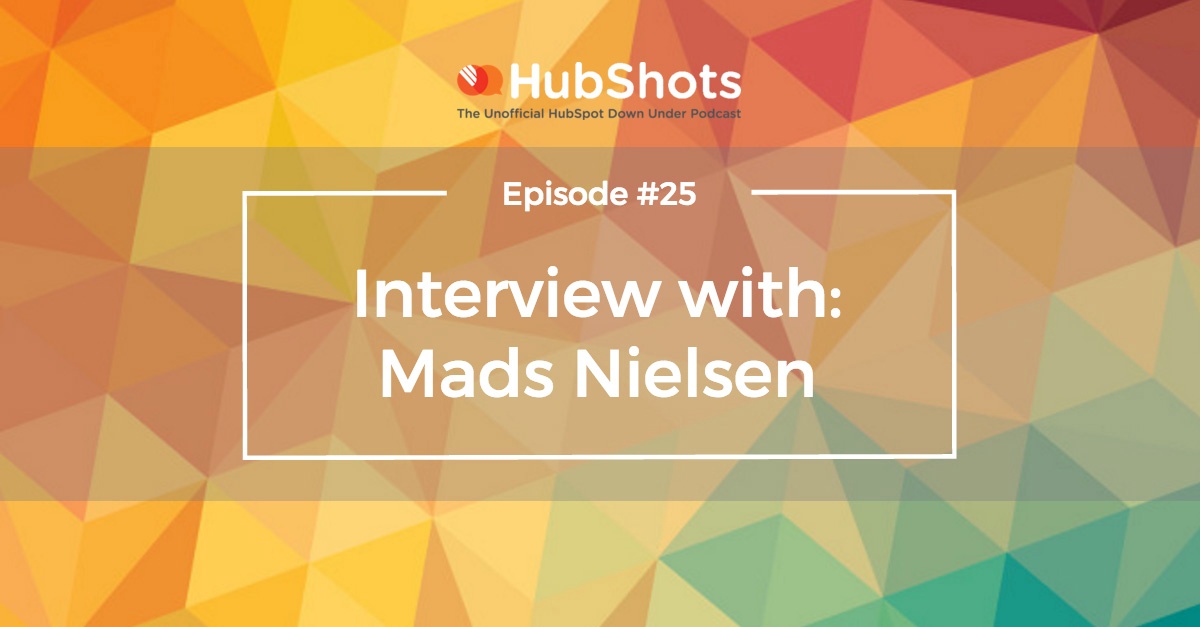Episode 113: HubSpot Tips and Gotchas, plus a cool tip in Excel
Welcome to Episode 113 of HubShots! Welcome to HubShots, APAC's number 1 HubSpot focussed podcast, where we discuss HubSpot tips and tricks, new...
10 min read
 HubShots
Updated on January 11, 2018
HubShots
Updated on January 11, 2018

Recorded: Friday 12 February and Tuesday 15 March 2016
In this episode we interview Mads Nielsen, Channel Account Manager for HubSpot Asia Pacific and discuss:
- making sure your customers are a good fit for your product/service
- what is inbound marketing
- the importance of having a good story to tell
- how starting the inbound conversations with sales (rather than marketing) can often be a big benefit to companies
- should Sales do Inbound certification
- the importance of everyone in the company being onboard with inbound
- why HubSpot isn’t a quick fix, it’s a long term strategy
- setting expectations for timeframes
- comparing platform costs with the effort required
- building a campaign is one of the first steps you should do when implementing HubSpot
- there’s still a window of opportunity for marketing managers to embrace inbound marketing
- wait for the pearl of wisdom at the end
Connect with Mads on LinkedIn at https://www.linkedin.com/in/madsn/en
[one_third_first]
[/one_third_first][one_third] [/one_third][one_third_last]
[/one_third][one_third_last] [/one_third_last]
[/one_third_last]
Ian Jacob: Now, Mads, tell us what you do at HubSpot in Asia Pacific?
Mads Nielsen: Oh, boy. What don't I do?
Ian Jacob: We hear you're a bit of a star.
Mads Nielsen: I am a star, I have to say. No, I'm what's called a CAM, which is a Channel Account Manager. And I work with sales, with marketing agencies, that are our HubSpot partners.
Craig Bailey: Okay. So you're dealing with agencies that are dealing with customers, say, marketing managers. So the listeners to the podcast, they might work with an agency. You're the person that works with the agency. So what we're interested at, in your experience working with agencies, what do you find that the marketing managers are doing well, or the agencies that are working well with marketing managers that are successful of doing? Are there any kind of general things that jump out at you?
Mads Nielsen: Well, it all comes down at the end to inbound marketing, right? So they need to be able to understand that concept. And I think the more old school they're used to working, the more harder it is to get them to kind of move over to that path. And so the ones who are doing it well are the ones who are open to change. I think that's the first thing that's really important. We talk a lot about fit at HubSpot, whether they're a good fit for our product, for our inbound marketing line. And that's one of the first things we feel out for.
Craig Bailey: Excellent. So we've actually heard that as a consistent theme, which is always good, what we're actually asking you, can you define inbound marketing as you understand it? Because quite often in Australia, and still in Asia Pac, people don't have a clear idea of what inbound marketing is.
Ian Jacob: And not many people search for it.
Mads Nielsen: Yeah, that's true. But what is inbound marketing? That's a really good question. So in my world, I think inbound marketing is around putting good content out there that people want to read. And that will then drive visitors to your website, basically see your product, see what you have to say. I think it's very much around not just telling them about all your fantastic products, but having a good story to tell.
Ian Jacob: That's really good. Now, you deal with a lot of sales. I talk about this quite often is that we're seeing this shift. Like you can bring great leads into a business, but if sales aren't treating those leads with the respect that's due, or they don't understand what the outcome needs to be, there's this massive misalignment.
And then some of the times sales will never even see who is in marketing, or even talk to anybody in marketing. And I think that's something that HubSpot's done pretty well, and that obviously the alignment there is very close. Having been in HubSpot for a while and being like a sales star in HubSpot, what are the steps you've taken to make that a success? And what have you seen that have been the key drivers for that success?
Mads Nielsen: I think part of that, it's kind of like a two-fold thing. I think the one thing is around...you touched upon sales and marketing. There's this marketing alignment, as we call it, which needs to be very much in part, but it very seldomly is.
So I think one of the biggest things that agencies can do to position themselves for better success is to go in there and not just talk to the marketing team and be that outsourced marketing team for them, but actually work with the sales department about what kind of leads are they looking for, and what qualifies as a good lead for them as well. And even though that kind of gets ticked off, sometimes you'll still have some misalignment, but it's all about tweaking and fine-tuning, at the end of the day.
Ian Jacob: Now, see, that's a really interesting point you make. Across the board, how many people or, say, partners you deal with, actually have conversations with sales teams?
Mads Nielsen: About 20%.
Ian Jacob: Yes. So that's what I thought. Because it's really interesting. Because in our agency, we seem to have a lot of conversations with head of sales now first before we even get to marketing. And I'm seeing this shift because people that have huge sales teams, people don't want to talk to them because they know they can get the information. Or they want to talk to the engineers that have the information. And so we're seeing this massive shift in the market. And I guess sales directors are finding that they need to find other ways to get to their markets. So inbound is a great way to do that.
But I just find, I think, on our side, education's becoming really big. They need to understand what they're getting and how they can get it. But I think a lot of it is going to fall on maybe marketing managers, but also even agencies to educate some of these people.
Mads Nielsen: I have to agree. I think agencies who start with sales get more insight and in-depth knowledge into what is actually causing revenue at the end of the day to be generated. And so if you use the sales team to a more effective...marketers seem to think that they know a lot of things and they can push out a lot of good leads for the sales team. The sales teams sit back and go, "No, they don't." So it's a bit of a give and take when it comes to that.
But I think that if you can nail the sales process in terms of what they're looking for, you can actually really help them on your inbound path, on what kind of content to write about, and to specify more personas because that really helps the sales team at the end of the day. And what everyone's looking for is revenue.
Craig Bailey: Okay. So let's talk about that a little bit more. So our listeners are predominantly marketing managers, so they might not have been exposed to this whole idea of sales and marketing alignment. They might be thinking, "Marketing just gets the lead. We hand it over the fence to sales." What are you seeing as successful companies doing? What would you say to marketing managers that have that opinion? Do you think that's changing?
Mads Nielsen: I think it is changing. I think it's taking a long time to change as well. I think there's a lot of education that goes into this piece. Both marketing managers and sales needs to be able to understand what each other's roles do to be able to kind of fine-tune that a little bit better.
But there is a big educational piece and a bit missing there in the block, especially in Australia as well. I see that there's still very much a little traditional...I see a lot of sales blames marketing and marketing blames sales. There's a lot of that going on. But I think that if you can meet in the midway around inbound, because you have content, you know what people have been doing, you can provide that better in-depth intel for the sales reps, it just becomes a better experience overall.
But also sales knows a lot, and know s a lot more than marketers might actually give them credit for. And it could be a good way to open the door and say, "Well, what kind of content shall we be focusing on?" and bring that into that alignment. That's where we have this smarketing alignment in.
Ian Jacob: Now, Mads, we've been doing all our certifications again this year.
Mads Nielsen: Sounds good.
Ian Jacob: How important is it, do you think, to put sales through inbound training?
Mads Nielsen: I think they need to understand the concept of inbound training. So I think that they need to take at least a certification on inbound. I think every sales rep should do that. And when it comes into using HubSpot and things like that, no, that doesn't really matter. But that initial inbound education, they need to understand to better provide feedback for marketing as well and as they go forward.
Ian Jacob: Yeah. And I think with that, obviously, they're going to be using tools like the CRM, at the end of the day. So I think that is very key. And as that grows in the whole marketing mix, I think that's going to be a really key thing to get people to be successful.
Mads Nielsen: I completely agree. On this fact, I think pretty much every agency working with their end users should go out and actually recommend a very, very fixed path on educating their sales team on inbound marketing. Because if they don't understand what they're being given, they're not utilizing the whole platform. So it's all about a give-and-take situation. But it is something that they need to do if a business is going to go in and actually actively position in by marketing as their strategy, going forward.
Ian Jacob: So this raises a really important question for me. We've got sales. We've got marketing, right?
Mads Nielsen: Yeah.
Ian Jacob: Now, what if the head of business is not on board with this or has no idea about inbound?
Mads Nielsen: Well, then there's another educational piece that needs to be taken care of there. The agency needs to go in and actually teach every aspect of the business, all the way from the top to the bottom, I think, when it comes to within marketing and sales. And that includes the CMO, and it includes sometimes a brush-up to the CEO because he needs to understand what's going on as a strategy from within the business. He needs to be, as a minimum, on board with the concept.
Craig Bailey: Right. So as a marketing manager listening to this, I guess the takeaway for them would be that if they're having trouble kind of getting buy-in for HubSpot, they actually need to go back a step and talk about the approach first in doing marketing, understanding that.
Mads Nielsen: Oh, yeah. Definitely.
Craig Bailey: So can I ask you then, because you're on the sales side, you're actually typically dealing with marketing managers at companies that are considering HubSpot as a tool. What are some of the common questions and problems that they're coming to you with hoping that HubSpot will solve?
Mads Nielsen: Well, one is that their website is more of a holding page, or a brochure, or something like that. But the biggest thing is like, "How do I have to change that?" And sometimes they're overwhelmed by some of the work that needs to be done.
HubSpot and inbound marketing is not a quick fix. It's something that matures over time. And they need to be on board for the longer term. A lot of them that are looking for a quick fix steer away from HubSpot a little bit because they're going, "That's a long-term fix." And it might be best for their company, but at the end of the day, they might not go ahead because they can't see that immediate return of investment.
Craig Bailey: What's long-term mean?
Mads Nielsen: Well, we generally tell people that it's anywhere between six to nine months before you start seeing the ball really rolling and kicking back on its heel and things like that, once you've actually done a full inbound marketing implementation. But it might be as quick as a couple of months, depending on what target you're going into, and how aggressive you are in terms of content that you're publishing and things like that.
But it can also be several years, depending on exactly how much you invest into it. So when I say several years, it's like if you just go out there and say, "A couple of blogs a month is enough, and I'm just going to tweak a little bit here and there," you might not see any return on investment for a long period of time. It does take some significant investment of time. And that's the biggest thing. It's not the money and the platform costs, it's around time.
Ian Jacob: It's the effort, right?
Mads Nielsen: Yeah, that's right.
Craig Bailey: Yeah, that's really good. Good point.
Ian Jacob: So from a perspective of people that you are seeing across the board, how quickly and reasonably possible is it to build out a campaign? Or people, what should they be doing to build campaigns? Because I was talking to someone the other day, and it's been almost a whole year and they have not build out a campaign.
Mads Nielsen: Well, that's the first thing you do when you get into HubSpot is you build a campaign. You deep dive right into the deep end around building campaigns, building content, and really structuring that and publicizing it as soon as possible. Because you need to build up that momentum, which takes time. So that is the first thing.
And how easy it is, it's pretty easy. We have a tool for it. We go into where we actually completely build out all the aspects that you need to remember when building out a campaign. It's a very thorough tool when it comes to that kind of stuff. And plus the reporting is amazing. So you can actually see whether the efforts that you're doing are paying off in terms of visitors and lead conversions and so on.
Ian Jacob: If you look at sales globally, let's say, for example, what do you see is the big difference between your counterparts in America and you here in Asia Pacific? Because we have customers that might be based here, but are going into the U.S. market. So what sort of insight can you can give us or our audience as to what the differences are, if there is anything at all?
Mads Nielsen: Well, the US. is a lot further ahead than we are here in Australia. Because they've had it for a while, the concept is becoming more of a day-to-day conversation than what it is here in Australia. If you think of it from that point of view, if they're going to go into a market like that, it's going to be much more receptive to it because it's already ready for it, where here, it's an educational piece much more. It's at that intermediate stage at this moment.
It's getting a lot better than what it was, but we've been here a couple of years now. We've had clients that have been on us for four or five years. So it's not something new to a lot of people. But the concept of implementing it, what it actually takes, is new, when you're marketing here. However, for the U.S., you would see a much more receptive market because it's been there longer.
Craig Bailey: That's actually an opportunity for marketing managers in Australia then. We're still behind in a sense, and so there's actually opportunity before everyone's on board to actually jump in now and get started.
Mads Nielsen: Oh, definitely. It's something to remember as well that eventually, this will be the way people market. And it is something that we're merging into. Traditional marketing is more or less dying off because people are blocking out all of the traditional ways of marketing and advertising. So it is something that is emerging. And the quicker you get on board, the more stronger you will be in the long run.
Ian Jacob: Now, what's one pearl of wisdom you can give us?
Mads Nielsen: So that's always tough because you learn so much every year. But I think...
Ian Jacob: Well, let's say in the last 12 months.
Mads Nielsen: The last 12 months, okay. Well, I think one of the things that I found is you have to continue to set the bar a little bit higher every time you move yourself through. You progress. So for me, personally, it's always been to get more requirements out of my agencies. And I think you guys will see the fun with that later on. But I think you should continue to move your bar for yourself. You need to continue to push yourself to improve. You can't just sit and rely on what you knew because things change constantly.

Welcome to Episode 113 of HubShots! Welcome to HubShots, APAC's number 1 HubSpot focussed podcast, where we discuss HubSpot tips and tricks, new...

Welcome to Episode 21 of HubShots! Interview: Remarkability with Ryan Bonnici (@ryanbonnici) - HubSpot Marketing Director Asia Pacific and Japan ...

Welcome to Episode 41 of HubShots! Interview: Smart Marketing with Niti Shah (@NitiFromBoston) - Senior Marketing Manager at HubSpot Southeast Asia ...